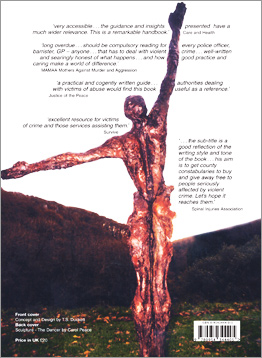
Media contributions and commentaries on crime victim, project work, strategic development and safeguarding policy work from all sectors and national governments.
![]()

Gscene – from the heart of Brighton and Hove, April 2005
What happens to you after you suffer a violent attack? Who do you go to for help? What help is available? Can I claim compensation? Surviving Violent Crime has the answer to these questions and many more. Written by a survivor of violent crime the book is penned from a victim’s perspective by someone with 15 years experience of working in social services as a strategic planner. Text book in approach it still manages to reflect a victim’s frustration as they steer their way through the criminal justice system with little accurate information available.
Every PCT, police station, community safety team and city library in the country should have a copy of this book as an essential reference not only for victims, but for those employed to give advice.
© April 2005 David Hodgson, Gscene Magazine
Glasgow Evening Times – 30 October 2004
Considering Glasgow’s reputation, this meticulously researched handbook should be on the bookshelves of anyone who has to deal with the victims of violent crime in the city.
Mr Duckett found out the hard way just how little is done for the victim and he has included all the information he wishes had been available when he needed help.
His background is in social work and although he's based in England, he has included information relevant to Scotland.
Mr Duckett points out the flaws in the system and signposts people to the best services and encourages them to avoid becoming trapped in the role of victim.
© 2004 Sheila Hamilton
Church Times – Coping with the coroner – 20 June 2003
Nick Tolson on a book of advice about the aftermath of violence
It is always a little depressing to find on page two of a book, a statement by the author that puts you off reading further. Under the title “If you need help urgent help because of violent crime…” TS Duckett writes: “If you feel terrified, shocked or overwhelmed, ask a police officer to arrange for you to see a consultant psychiatrist – preferably one who understands the early symptoms of post-traumatic stress disorder.”
I had two issues with this. In my experience, it certainly isn’t the
police officer’s job to contact a psychiatrist, it is the job of a GP
or police surgeon. And second, if you are feeling terrified, shocked
or overwhelmed, you will hardly be in any state to ask a police officer
to help you see a psychiatrist.
This book is intended as a handbook for those who have suffered from violent crime, to help guide them through the complicated processes that may necessarily follow such an event. These processes may take literally years to complete.
The author begins with a question: “Why a handbook for victims?” In answer, he includes the comment: “A concise handbook has a role to play, which explains what is happening and why this army has descended on you.”After reading this hefty (477 pages), I decided that it definitely wasn’t the handbook he was talking about.
Having said that, the book has some significant redeeming qualities and might be useful to anyone dealing with someone who has suffered from a serious violent act, against either them or someone they love – up to and including murder.
The chapter on post-mortems, coroners and inquests is excellent. To anyone who hasn’t previously been through the death of a loved one (whether violent or not), it is a strange system; and TS Duckett covers the procedures in exceptional detail. Also, the directory that fills the last 100 pages of the book is very informative – the book is worth buying just for that.
Mr Duckett lets himself down in failing to mention any faith group in his discussion of how a victim of violent crime can move down the long road to recovery, mentally and physically. There is no recognition, nor even discussion, of the effects of faith-healing or prayer. This is despite a case study in which the victim says: “I received enormous support and help from the Roman Catholic chaplains at the hospital,” and “All I can say is that the real help received has come from the church, my GP practice, my family and friends.”
I would have thought that the support that various faith groups can give would be a glimmer in the dark picture that Mr Duckett has painted of the support a victim of violent crime receives.
Nick Tolson, who is the National Churchwatch Co-ordinator, trains clergy and church workers in personal-safety techniques, and also helps dioceses, police forces and other faiths in crime-reduction.
© Church Times 2003